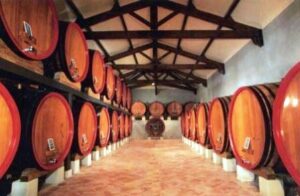
Learn everything about Caves Saint Pierre Chateauneuf du Pape with wine tasting notes, wine and food pairing tips, best vintages, a history of the property and information on the vineyards and winemaking. If you want to read about other important wineries and wine makers from the Rhone valley: Links to all Rhone Valley Wine Producer Profiles
Caves Saint Pierre was created in 1898 by the Bouachon family who already owned the negociant firm of Maison Bouchon. The estate changed hands in 2001 when it was purchased by Skalli Family Wines. The Bouchon family continues to manage the estate and the negociant firm today.
Caves Saint Pierre Vineyards, Wines, Winemaking
Caves Saint Pierre and Maison Bouchon produces and markets a wide range of wines from the Southern Rhone Valley from a myriad of appellations, not just Chateauneuf du Pape. In Chateauneuf du Pape, they produce 2 red wines and 1 white Chateauneuf du Pape wine.
Caves Saint Pierre also produces wine from Gigondas, Vacqueyras, Tavel, Muscat de Beaume, Ventoux and the Cotes du Rhone appellation.
Caves Saint Pierre La Tiara du Pape is produced from 60% Grenache, 30% Syrah, 7% Mourvedre and 3% of assorted grape varieties. The wine is aged in a combination of old foudres and used oak barrels for 12 months before bottling. On average, the production is close to 3,000 cases per year.
Caves Saint Pierre Dedication is produced from a blend of 60% old vine Grenache, 20% Syrah and 20% Mourvedre. The wine is aged in used, French oak barrels for 12 months before bottling. The production is on average, 500 cases per year.
Caves Saint Pierre La Tiara du Pape Blanc is made from a blend of 60% Grenache Blanc, 20% Roussanne, 15% Bourboulenc and 5% Clairette. The wine is aged for 6 months on its lees in a combination of oak barrels and tank.
When to Drink Caves Saint Pierre, Anticipated Maturity, Decanting Time
Caves Saint Pierre is fine to drink on the young side. Young vintages can be popped and poured, or decanted for about 1 hour. This allows the wine to soften and open its perfume. Older vintages might need very little decanting, just enough to remove the sediment.
Caves Saint Pierre is usually better with 2-3 years of bottle age. Of course that can vary slightly, depending on the vintage. In the best vintages the wine should be consumed within 3-10 years after the vintage.
Serving Caves Saint Pierre with Wine, Food, Pairing Tips
Caves Saint Pierre is best served at 15.5 degrees Celsius, 60 degrees Fahrenheit. The cool, almost cellar temperature gives the wine more freshness and lift.
Caves Saint Pierre is best served with all types of classic meat dishes, veal, pork, beef, lamb, duck, game, roast chicken, roasted, braised, stewed dishes, barbecue, sausage, cassoulet cheese. Caves Saint Pierre is also good with Asian dishes, hearty fish courses like tuna, mushrooms pasta, eggplant and tomatoes.
The white wine of Caves Saint Pierre is best served with a myriad of different seafood dishes, shellfish, crab, lobster, sushi, sashimi, chicken, pork and veal, as well as Asian cuisine.
Caves Saint-Pierre Wine Tasting Notes
5 Vintages 9,674 Views Sort by Vintage-Rating
|
2014
Caves Saint-Pierre (Châteauneuf-du-Pape)
Sweet, ripe cherries, a bit of spice and freshness, without much depth in an east drinking style. 1,830 Views Tasted Jun 23, 2016 |
|
2012
Caves Saint-Pierre La Tiare Imperiale (Châteauneuf-du-Pape)
Soft, silky, sweet and fresh, the peppery dark cherries stand out. 2,432 Views Tasted Sep 17, 2014 |
|
2012
Caves Saint-Pierre (Châteauneuf-du-Pape)
With good color, the wine serves up roasted, sweet, spicy fruits with a supple, maraschino cherry core. 1,997 Views Tasted Sep 10, 2014 |
|
2011
Caves Saint-Pierre La Tiare Imperiale (Châteauneuf-du-Pape)
Medium bodied, fresh red berries are complicated by dark, juicy plum and spice in the easy going finish. 2,152 Views Tasted Aug 26, 2014 |
|
2011
Caves Saint-Pierre (Châteauneuf-du-Pape)
Open and forward, medium bodied and focused on its red berry core. There is a touch of dryness in the fresh finish. 1,263 Views Tasted Aug 19, 2014 |

